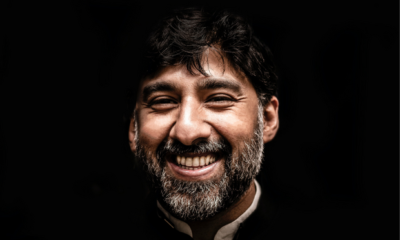Life
The Happiness Model That’ll Change Any Entrepreneurs Life
People often think that they will be happy at a later stage if they work hard today. However, there is no guarantee of happiness at a later stage.

Due to the rapid growth in technology, people are often in the rat race to compete with others little realizing that they are losing so much or so little. People often search for stones by leaving gems at home.
People often think that they will be happy at a later stage if they work hard today. However, there is no guarantee of happiness at a later stage.
In this context, I would like to discuss Ben-Shahar’s Happiness Model which is thought-provoking for busy people to take a look at and find meaning in their lives.
Dr. Tal Ben-Shahar is the author of several books and a specialist in “Positive Psychology.” He is the author of various books such as The Pursuit of Perfect: How to Stop Chasing Perfection and Start Living a Richer, Happier Life and Happier: Learn the Secrets to Daily Joy and Lasting Fulfillment.
He has designed a Happiness Model which is also known as “The Hamburger Model”. It contains four quadrants representing Nihilism, Hedonism, Rat Race, and Happiness.
Here is the information taken from his book ‘Happier’ to bring awareness about this model for the benefit of readers.
Ben-Shahar’s Happiness Model
Nihilism: Nihilism falls in the bottom left-hand quadrant of the Happiness Model. Nihilists are people who have given up hope of finding meaning in life. They don’t enjoy any present happiness, nor do they have any sense of purpose or hope for the future. As a result, they’re “resigned to their fate.”
Hedonism: Hedonism falls in the lower right-hand quadrant of the model. Hedonists focus on present happiness only, and give little thought to future consequences. They may think that “working hard” is painful and tedious, and may avoid this. As a result, hedonists feel unchallenged and are often unfulfilled.
Rat Race: The Rat Race falls in the upper left-hand quadrant of the model. In the Rat Race, we detrimentally put off present happiness in the hope of some future benefit. This archetype is likely the most familiar to many of us. Here, people constantly pursue goals that they think will make them happy. When those goals are achieved, however, a new goal almost immediately takes its place. While Rat Racers may experience brief flashes of satisfaction when they achieve goals, any thought of present happiness is then quickly pushed to the side.
Happiness: The Happiness archetype falls in the upper right quadrant of the model. This archetype reflects a good balance between present happiness and future benefits.
Precisely, the Happiness Model defines four happiness archetypes as follows:
- Nihilism – Nihilists have lost the joy in life. They derive no present pleasure in their work or life and expect no future benefits or rewards. They’ve “given up.”
- Hedonism – Hedonists live for the moment. They pursue pleasure and an easy life and give little or no thought to future consequences and plans.
- Rat Racing – The Rat Race archetype often sacrifices current pleasures and benefits in anticipation of some future reward.
- Happiness – True happiness is achieved when there is a perfect balance between present pleasure and future benefits.
“Happiness grows less from the passive experience of desirable circumstances than from involvement in valued activities and progress toward one’s goals.” — Tal Ben-Shahar
Current Global Scenario
It is rightly said that a young person looks at the future; the middle-aged person looks at the present while the old-aged person looks at the past. However, in the cut-throat competitive world young, middle-aged, and old are running behind something for which they don’t have any clarity.
The present position is such that parents don’t have time to spend with their children. As a result, children find emotional gaps and search elsewhere for the same. Sometimes the crimes shoot up among the children and teenagers as parents don’t find time to guide and groom them.
Old people are uncared by children as the latter are busy with their survival and success.
We are living in a competitive world where people often intend to outsmart others without realizing any meaning in life. God gave us life.
We must learn to make use of the most by striking a balance between pressure and pleasure, between rapidity and slowness. Otherwise, there is no meaning to life.
Happiness is a state of mind. It comes in any way such as through wealth, knowledge, power, prestige, or love. However, it depends on the priority of the person.
People often think that happiness is an end but the fact is that happiness is a means. People struggle and sacrifice throughout their life journey to think about the destination of happiness.
True happiness lies in the journey, not in the destination.
It is essential to strike the balance between today and tomorrow. Several books have come up learning to live in the present rather than getting bogged down about the past and over anxious about the future.
Hence, let us learn to live in the present rather than being worried about the past that cannot be changed and concerned about the future that can not be predicted.
Learn to strike a balance between the past, present, and future and also between the pressure and pleasure to find meaning in your life.
Life
Why Moving to a New City Can Change Your Mindset
Discover how moving to a new city boosts neuroplasticity, builds resilience, and reshapes your mindset

Relocation is always a challenge. Rebuilding and restarting your life requires you to step outside of your comfort zone. (more…)
Change Your Mindset
The Hidden Reason You Can’t Stay Consistent
If motivation keeps failing you, the real issue isn’t discipline. It’s the identity shaping your habits and long-term success.

Success often looks like a time-management problem. You buy a planner, set reminders, and hope that next week will be different. For a few days, it works. Then stress hits, motivation drops, and old patterns return. (more…)
Did You Know
How Skilled Migrants Are Building Successful Careers After Moving Countries
Behind every successful skilled migrant career is a mix of resilience, strategy, and navigating systems built for locals.

Moving to a new country for work is exciting, but it can also be unnerving. Skilled migrants leave behind familiar systems, networks, and support to pursue better job opportunities and a better future for their families. (more…)
-

 Business3 weeks ago
Business3 weeks agoHow Smart Brands Use Instagram Data to Outperform Competitors
-

 Business4 weeks ago
Business4 weeks agoThe Paradox of Modern Work: Can Tech Make Us More Human?
-

 Change Your Mindset3 weeks ago
Change Your Mindset3 weeks agoThe Hidden Reason You Can’t Stay Consistent
-

 Change Your Mindset3 weeks ago
Change Your Mindset3 weeks agoThe Real Psychology Behind Quitting Too Soon
-

 Entrepreneurs2 weeks ago
Entrepreneurs2 weeks agoThe Six Pillars That Ground Purpose-Driven Leadership (The Berenyi Life Blueprint)
-

 Business3 weeks ago
Business3 weeks agoHow AI Agents Can Quietly Expose Your Business to Serious Risk
-

 Business3 weeks ago
Business3 weeks agoDIY vs Delegate: The Real Reason You’re Burned Out
-

 Life2 weeks ago
Life2 weeks agoWhy Moving to a New City Can Change Your Mindset





























